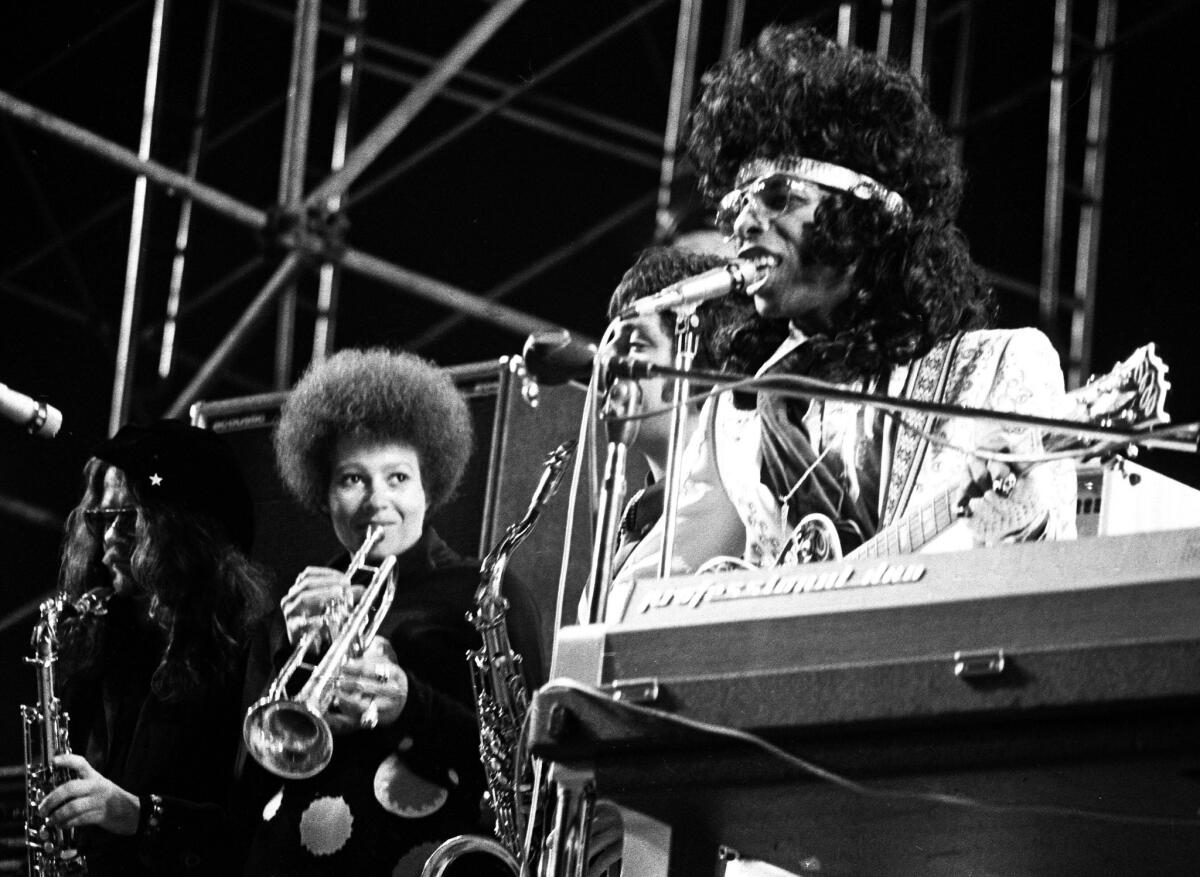Why Sly Stone still can’t collect royalties from his classic songs

Sly and The Family Stone perform onstage at the Los Angeles Free Clinic Benefit, circa 1972. Stone’s $5-million royalties judgment is in jeopardy.
A judge has handed a legal setback to Sylvester “Sly” Stone, ruling that he won’t be able to collect $5 million in royalties because he previously had assigned those royalties to a production company.
Last January, a Los Angeles Superior Court jury found that the iconic soul and funk musician had not been fully paid for songwriting royalties. The civil jury said that manager Jerry Goldstein, attorney Glenn Stone and Even St. Productions owed Stone $5 million in royalties and damages.
SIGN UP for the free Essential Arts & Culture newsletter >>
But in a Dec. 7 ruling, Superior Court Judge Mark V. Mooney said that Stone had assigned his royalties to Even St. Productions in 1989 in return for 50% ownership in the company.
“Mr. Stewart entered into the agreement with the assistance of advisors ... and received a substantial benefit from entering into the agreement,” the judge wrote.
Greg Bodell, an attorney for Goldstein and Glenn Stone, said that his clients were happy with the outcome.
“It’s been a long time coming, and it is the right outcome,” Bodell said. He said his clients had been wrongly accused of defrauding the musician Stone — whose given name is Sylvester Stewart — into signing contracts, as well as misrepresenting the duration of the contracts. “The judge has now put both of those to rest.”
Stone could not be reached for comment.
His attorney, Robert Allan, said the decision upset his client, 72, who considered the suit his best hope for escaping poverty. The artist has battled drug addiction for decades and, despite his music’s continued popularity, was for a time living out of a recreational vehicle.
“Obviously, I’m kind of devastated,” said Sylvester Stewart Jr., the musician’s son, adding that he had faith that his father’s legal team would continue fighting for his cause. He said that his father is trying to keep upbeat.
“He’s really sick of this, of not having his money that he’s deserved. But at the same time, he’s not being a downer or an unpleasant person. He’s still being as creative as he can be, given the circumstances. But he’s not happy. He’s not living the way he should be living right now.”
Stone wrote such classics as “Everyday People,” “Stand!” and “Dance to the Music.”
“My dad hasn’t seen a dime of that money when he’s needed it most,” Stewart Jr. said. “I feel like I’m going to wake up and this part of this case is going to be a dream, like, ‘Wow, I was dreaming that Dad won this money,’ only he never got the money.”
Follow me on Twitter: @liledit
MORE MUSIC NEWS
How does it feel to sing like Bob Dylan? Find out here
‘The most hated man in America’ bought the secret Wu-Tang Clan album
Golden Globes 2016: Sam Smith, Wiz Khalifa lead tight race for original song
More to Read
The biggest entertainment stories
Get our big stories about Hollywood, film, television, music, arts, culture and more right in your inbox as soon as they publish.
You may occasionally receive promotional content from the Los Angeles Times.











